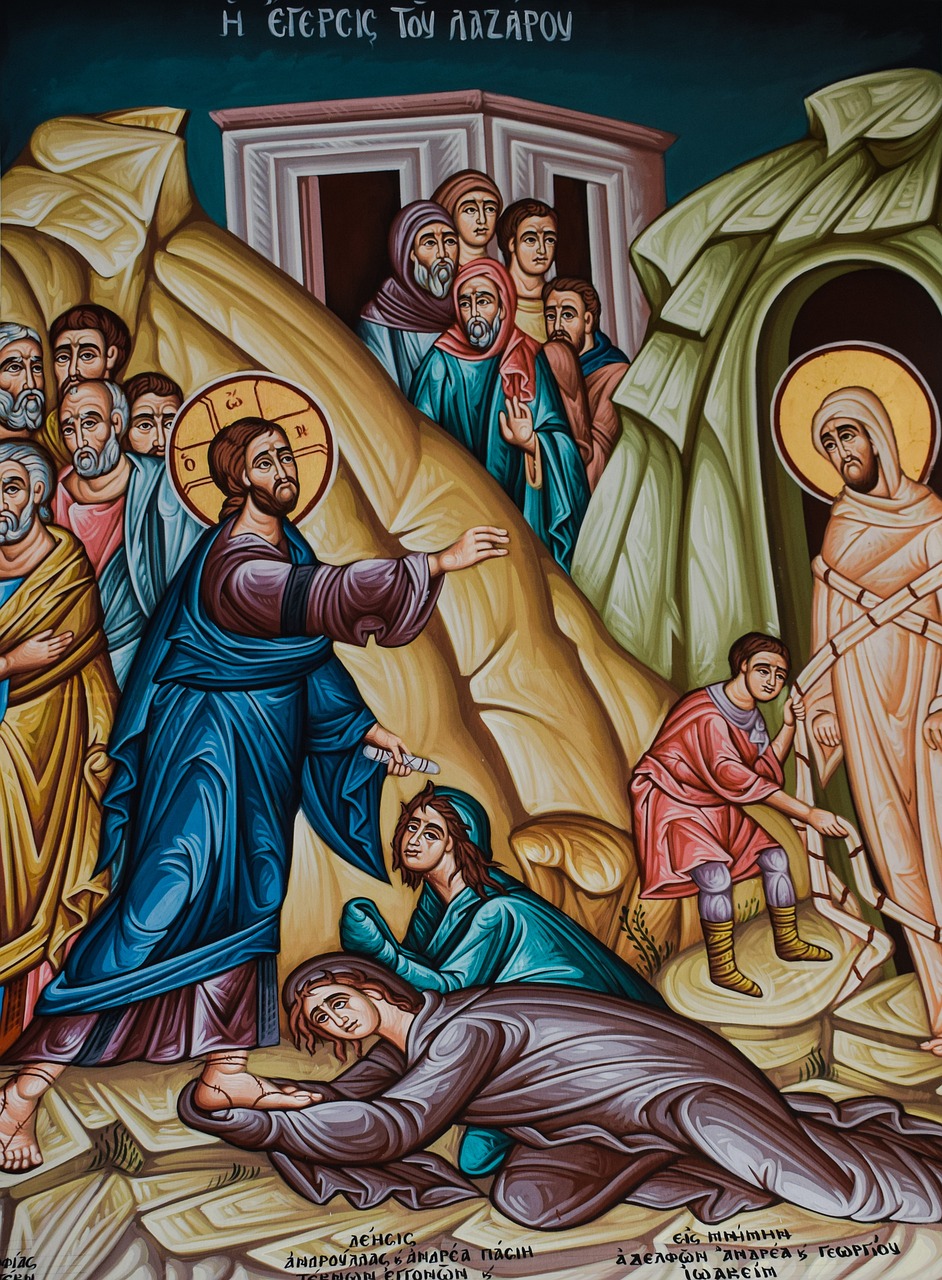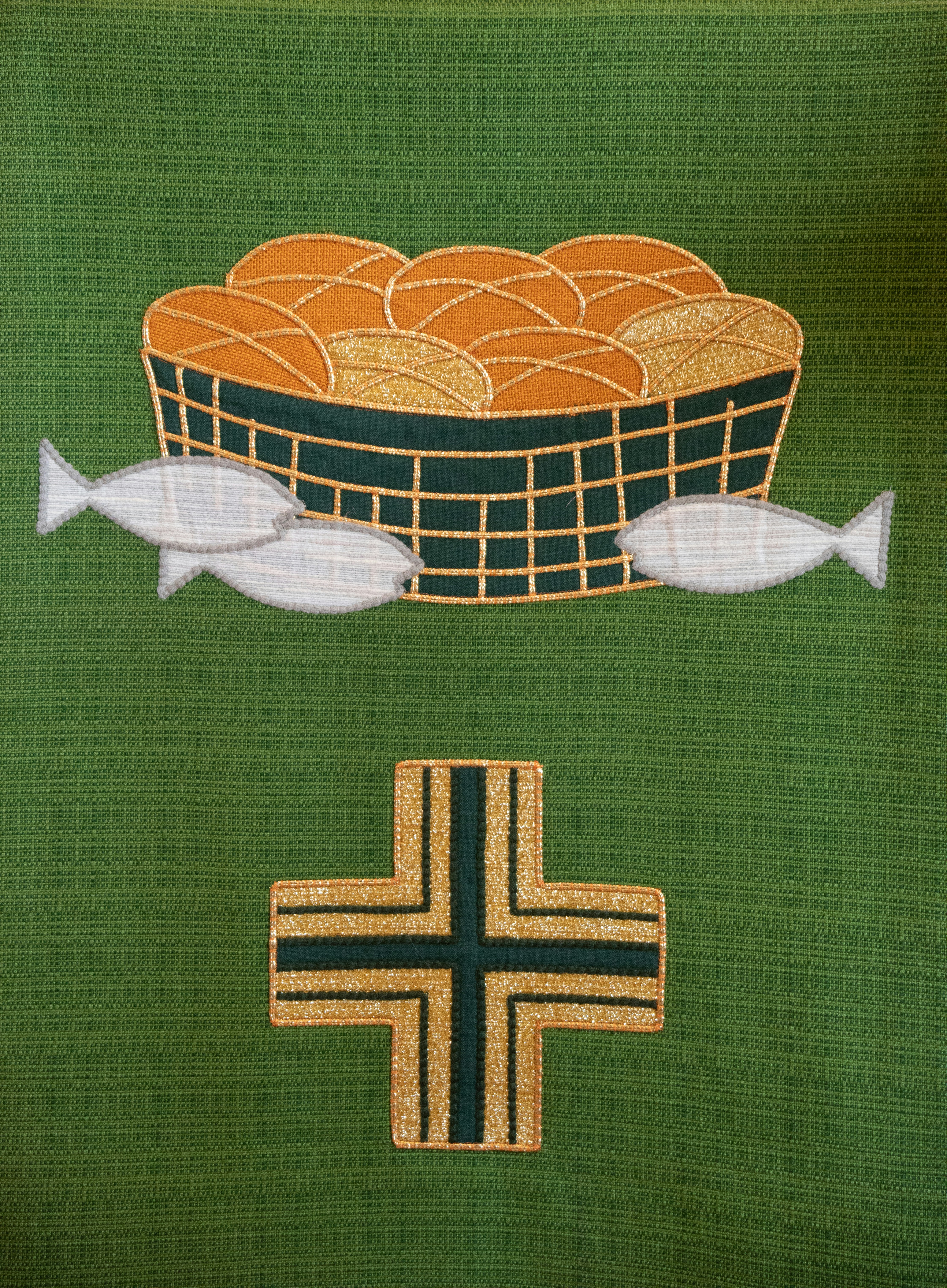We hear the term “sibling rivalry” in our culture referring to siblings competing with one another. My three children jokingly ask me which one of them is my favorite. I reply that my daughter is my favorite daughter, my oldest son is my favorite oldest son, and my youngest son is my favorite youngest son. I respond in a way that makes it impossible for any of my children to be anything other than my beloved child. I tell my kids that I want sibling revelry not rivalry in my house.
Today we celebrate the feast of sibling saints Mary, Martha, and Lazarus. Some spiritual writings about them, especially ones about Mary and Martha, create a “rivalry” between the sisters or lift up only the traits that we may find most appealing about the sisters while downplaying others. But both are prayerful.
Let’s revel in the united prayerfulness of Mary and Martha and marvel at how they interceded with Jesus out of profound love for their brother, Lazarus. The sibling revelry in their story is beautiful. Today’s Gospel passage begins with Jesus arriving at Bethany after the death of Lazarus. While Mary stays in the house, Martha goes out to meet Jesus and tells him, “Lord, if you had been here, my brother would not have died. But even now I know that whatever you ask from God, God will give you” (Jn 11:22). This is a prayer of honesty and faith.
Jesus engages with Martha exactly where she is. He doesn’t try to change her or dissuade her prayer. Instead, Jesus offers Martha a promise, “Your brother will rise again” (11:23). Martha responds with an expression of her faith in the resurrection, and as the conversation proceeds, Jesus says, “I am the resurrection and the life; he who believes in me, though he die, yet shall he live, and whoever believes in me shall never die. Do you believe this?” Martha’s answer reveals tremendous faith in Jesus and is one of the earliest recorded creeds. She professes, “Yes, Lord; I believe that you are the Christ, the Son of God, he who is coming into the world.”
In the verses after today’s reading from John, Mary leaves the house and goes to Jesus. Falling at his feet, she prays the same prayer as her sister, “Lord if you had been here my brother would not have died” (11:32). Can you see how much each sister loved their brother and how much they believed in, and loved, Jesus? Surely these sisters had different personalities, gifts, and demeanors. But there is revelry here, not rivalry. Mary and Martha were united in their belief in Jesus and their love for their brother. These are unifying aspects in a family and ones to celebrate.
En nuestra cultura escuchamos el término “rivalidad entre hermanos” refiriéndose a hermanos que compiten entre sí. Mis tres hijos me preguntan en broma cuál de ellos es mi favorito. Respondo que mi hija es mi hija favorita, mi hijo mayor es mi hijo mayor favorito y mi hijo menor es mi hijo menor favorito. Respondo de una manera que hace imposible que cualquiera de mis hijos sea otra cosa que mi hijo amado. Les digo a mis hijos que quiero juerga entre hermanos, no rivalidad, en mi casa.
Hoy celebramos la fiesta de los hermanos santos María, Marta y Lázaro. Algunos escritos espirituales sobre ellos, especialmente sobre María y Marta, crean una “rivalidad” entre las hermanas o resaltan sólo los rasgos que podemos encontrar más atractivos de las hermanas, mientras restan importancia a otros. Pero ambas son mujeres de oración.
Deleitémonos en la oración unida de María y Marta y maravillémonos de cómo intercedieron ante Jesús por profundo amor por su hermano Lázaro. La unidad entre hermanos en su historia es hermosa. El pasaje del Evangelio de hoy comienza con la llegada de Jesús a Betania después de la muerte de Lázaro. Mientras María se queda en casa, Marta sale al encuentro de Jesús y le dice: “Señor, si hubieras estado aquí, no habría muerto mi hermano. Pero aún ahora estoy segura de que Dios te concederá cuanto le pidas” (Jn 11,22). Es una oración de honestidad y fe.
Jesús se relaciona con Marta precisamente donde se encuentra. Él no intenta cambiarla ni disuadir su oración. En cambio, Jesús le ofrece a Marta una promesa: “Tu hermano resucitará” (11,23). Marta responde con una expresión de su fe en la resurrección y, a medida que avanza la conversación, Jesús dice: “Yo soy la resurrección y la vida. El que cree en mí, aunque haya muerto, vivirá; y todo aquel que está vivo y cree en mí, no morirá para siempre. ¿Crees tú esto?” La respuesta de Marta revela una tremenda fe en Jesús y es uno de los credos más antiguos registrados. Ella profesa: “Sí, Señor. Creo firmemente que tú eres el Mesías, el Hijo de Dios, el que tenía que venir al mundo”.
En los versículos posteriores a la lectura de Juan de hoy, María sale de la casa y se acerca a Jesús. Cayendo a sus pies, reza la misma oración que su hermana: “Señor, si hubieras estado aquí, mi hermano no habría muerto” (11,32). ¿Puedes ver cuánto amaba cada hermana a su hermano y cuánto creían y amaban a Jesús? Seguramente estas hermanas tenían diferentes personalidades, dones y comportamientos. Pero aquí hay unidad, no rivalidad. María y Marta estaban unidas en su creencia en Jesús y en su amor por su hermano. Estos son aspectos unificadores en una familia para celebrar.
 Elizabeth Tomlin is the author of Joyful Momentum: Building and Sustaining Vibrant Women’s Groups and contributing author to the Ave Prayer Book for Catholic Mothers. She is General Counsel for the Archdiocese for the Military Services, USA. Elizabeth is an Army wife and mother of three and currently lives in the DC area. She blogs at JoyfulMomentum.org or @elizabethannetomlin on social media.
Elizabeth Tomlin is the author of Joyful Momentum: Building and Sustaining Vibrant Women’s Groups and contributing author to the Ave Prayer Book for Catholic Mothers. She is General Counsel for the Archdiocese for the Military Services, USA. Elizabeth is an Army wife and mother of three and currently lives in the DC area. She blogs at JoyfulMomentum.org or @elizabethannetomlin on social media.
Feature Image Credit: dimitrisvetsikas1969, pixabay.com/photos/the-raising-of-lazarus-iconography-2069644/


 Dr. Alexis Dallara-Marsh is a board-certified neurologist who practices in Bergen County, NJ. She is a wife to her best friend, Akeem, and a mother of two little ones on Earth and two others in heaven above.
Dr. Alexis Dallara-Marsh is a board-certified neurologist who practices in Bergen County, NJ. She is a wife to her best friend, Akeem, and a mother of two little ones on Earth and two others in heaven above.




 Tami Urcia grew up in Western Michigan, a middle child in a large Catholic family. She spent early young adulthood as a missionary in Mexico, studying theology and philosophy, then worked and traveled extensively before finishing her Bachelor’s Degree in Western Kentucky. She loves tackling projects, finding fun ways to keep her little ones occupied, quiet conversation with the hubby and finding unique ways to love. She works full time at Diocesan, is a guest blogger on
Tami Urcia grew up in Western Michigan, a middle child in a large Catholic family. She spent early young adulthood as a missionary in Mexico, studying theology and philosophy, then worked and traveled extensively before finishing her Bachelor’s Degree in Western Kentucky. She loves tackling projects, finding fun ways to keep her little ones occupied, quiet conversation with the hubby and finding unique ways to love. She works full time at Diocesan, is a guest blogger on 
 Deacon Dan Schneider is a retired general manager of industrial distributors. He and his wife Vicki have been married for over 50 years. They are the parents of eight children and thirty-one grandchildren. He has a degree in Family Life Education from Spring Arbor University. He was ordained a Permanent Deacon in 2002. He has a passion for working with engaged and married couples and his main ministry has been preparing couples for marriage.
Deacon Dan Schneider is a retired general manager of industrial distributors. He and his wife Vicki have been married for over 50 years. They are the parents of eight children and thirty-one grandchildren. He has a degree in Family Life Education from Spring Arbor University. He was ordained a Permanent Deacon in 2002. He has a passion for working with engaged and married couples and his main ministry has been preparing couples for marriage.


 Kathryn Mulderink, MA, is married to Robert, Station Manager for Holy Family Radio. Together they have seven children (including Father Rob), and eight grandchildren. She is President of the local community of Secular Discalced Carmelites and has published five books and many articles. Over the last 30 years, she has worked as a teacher, headmistress, catechist, Pastoral Associate, and DRE, and as a writer and voice talent for Catholic Radio. Currently, she serves the Church by writing and speaking, and by collaborating with various parishes and to lead others to encounter Christ and engage their faith. Her website is
Kathryn Mulderink, MA, is married to Robert, Station Manager for Holy Family Radio. Together they have seven children (including Father Rob), and eight grandchildren. She is President of the local community of Secular Discalced Carmelites and has published five books and many articles. Over the last 30 years, she has worked as a teacher, headmistress, catechist, Pastoral Associate, and DRE, and as a writer and voice talent for Catholic Radio. Currently, she serves the Church by writing and speaking, and by collaborating with various parishes and to lead others to encounter Christ and engage their faith. Her website is 



 Mike Karpus is a regular guy. He grew up in Michigan’s Upper Peninsula, graduated from Michigan State University and works as an editor. He is married to a Catholic school principal, raised two daughters who became Catholic school teachers at points in their careers, and now relishes his two grandchildren, including the older one who is fascinated with learning about his faith. He also has served on a Catholic school board, a pastoral council and a parish stewardship committee. He currently is a lector at Mass, a Knight of Columbus, Adult Faith Formation Committee member and a board member of the local Habitat for Humanity organization. But mostly he’s a regular guy.
Mike Karpus is a regular guy. He grew up in Michigan’s Upper Peninsula, graduated from Michigan State University and works as an editor. He is married to a Catholic school principal, raised two daughters who became Catholic school teachers at points in their careers, and now relishes his two grandchildren, including the older one who is fascinated with learning about his faith. He also has served on a Catholic school board, a pastoral council and a parish stewardship committee. He currently is a lector at Mass, a Knight of Columbus, Adult Faith Formation Committee member and a board member of the local Habitat for Humanity organization. But mostly he’s a regular guy.
